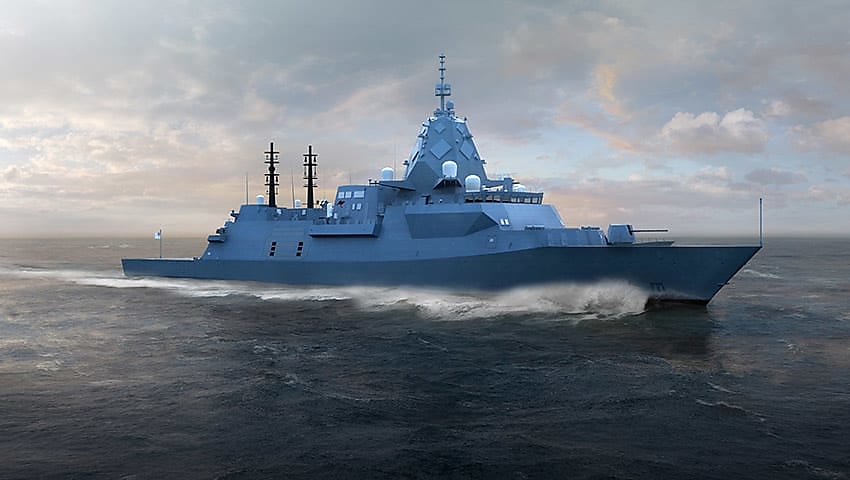BAE Systems Australia, Flinders University and the Innovative Manufacturing Cooperative Research Centre (IMCRC) have announced a $2.9 million partnership (out of a $9 million in total value) to develop and pilot cutting-edge manufacturing technologies that will be used to build nine anti-submarine warfare frigates.
To continue reading the rest of this article, please log in.
Create free account to get unlimited news articles and more!
The new technologies will be used by BAE Systems Australia’s shipbuilding business, ASC Shipbuilding, to build the Hunter Class frigates for the Royal Australian Navy at the world-class shipyard at Osborne in South Australia.
In partnership with Flinders University and local small and medium enterprises (SMEs), the project will drive digital transformation through advanced robotics, assistive manufacturing and readiness for Industry 4.0 utilisation – both inside the shipyard and more widely in the Australian supply chain.
BAE Systems Australia welcomed the funding from the IMCRC, which matches the company’s $1.45 million investment and is on top of the $5 million already invested in developing digital technologies, to turn the digital shipyard concept into reality.
IMCRC CEO and managing director David Chuter said, "Digital technologies such as artificial intelligence, robotics, cognitive automation and advanced analytics are redefining the Australian manufacturing sector and therefore the nature of its work."
The new $2.9 million cash investment will create seven new research positions at Flinders University – bringing the total number of researchers to 16 – at the digital test and trial collaboration hub at Tonsley Innovation District in Adelaide’s south.
"Australian manufacturers, particularly small and medium enterprises, need to learn how to embrace and contribute to new work environments that blend advanced technologies and digital skills with uniquely human skills," Chuter added.
Chuter explained to Defence Connect, "The really exciting part of this announcement is the development of high technology jobs here in Australia, which won't replace existing jobs, it will enhance them.
"A key component of this program is bringing, high-skill, high-wage jobs to Australia and producing world beating technology right here at home that will provide robust partnerships at home and abroad – it is a really exciting example of what happens when Industry, Government and Academia work together," Chuter added.
From March 2020 until 2022 – when steel is cut on the first Hunter Class frigate – the researchers will work with the shipbuilding workforce to trial advanced manufacturing technologies for application in the shipyard and beyond.
ASC Shipbuilding managing director Craig Lockhart said, "At Tonsley we are working in partnership with Flinders University to embrace a culture of innovation, conducting research and developing emerging technologies in order to gain an insight into how shipyard workers will interact with digital technologies, and so we welcome the $1.45 million funding from the IMCRC."
These technologies enable connectivity between manufacturing equipment to databases that will provide real-time insights into shipyard and supply chain performance, leading to enhanced productivity, safety and quality outcomes.
"Our employees will use these technologies alongside advanced manufacturing techniques to drive greater efficiency and increased productivity, enabling us to operate smarter and be more agile in our decision-making and responsive to our environment. An important aspect of the research at the collaboration hub is that we want to share the outcomes with industry, to help educate others on the importance and implementation of Industry 4.0," Lockhart added.
The Tonsley Innovation District will be located at the former Mitsubishi car factory and includes Flinders University and Tonsley TAFE, as well as a range of businesses – new and established – focusing on advanced manufacturing.
Flinders University president and vice-chancellor Professor Colin Stirling said, "Thanks to this strategic investment, Flinders University’s research expertise in advanced manufacturing will help to ensure that the Hunter Class frigates will be built by ASC Shipbuilding using world-leading technologies."
In October 2019, ASC Shipbuilding and Flinders University announced a partnership to establish the digital test and trial collaboration hub, located within the university’s advanced manufacturing research facility at Tonsley.
"Our strengths in Industry 4.0 and cutting-edge digital laboratories will enable the development and testing of bespoke technologies to advance the specialised construction processes required for this nationally significant project," Professor Stirling added.
"The IMCRC’s commitment recognises the value of the partnership that Flinders University has forged with ASC Shipbuilding and is further testament to the calibre of our researchers, our exceptional facilities and our leadership in innovation."
By June 2020, it is expected there will be more than 20 researchers working in the hub, together with other SME collaborators. Prototyping on the Hunter program will begin late this year. Prototyping is where all the processes, systems, tools, facilities and workforce competencies will be tested and refined before construction on the first frigate commences at the Osborne Naval Shipyard in 2022.
The Hunter Class Frigate Program will create and sustain 5,000 jobs across BAE Systems Australia and the defence supply chain over the life of the program.
Stephen Kuper
Steve has an extensive career across government, defence industry and advocacy, having previously worked for cabinet ministers at both Federal and State levels.

 Login
Login








